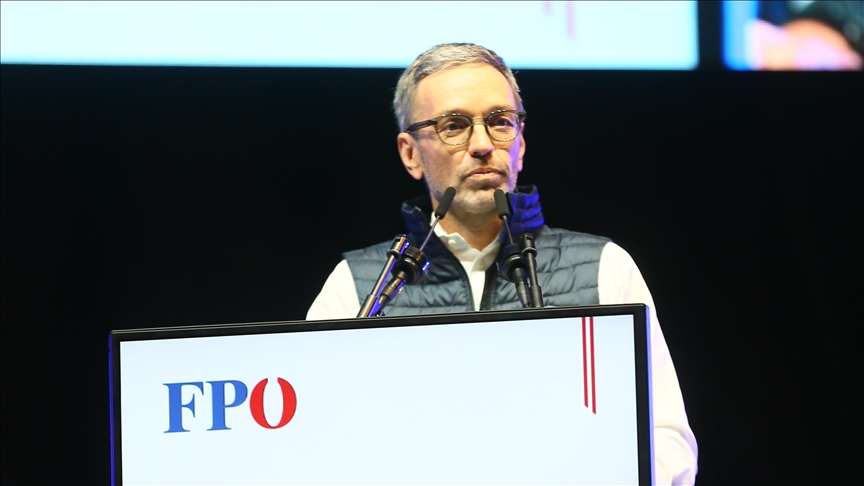- Observers agree that the FPO and OVP share common ground on many policies. However, this time, the FPO’s electoral victory has shifted the balance of power, compelling the OVP to concede more
The author is a senior researcher at Georgetown University’s The Bridge Initiative.
ISTANBUL
After the coalition talks between the Austrian People’s Party (OVP), the Social Democrats (SPO), and the Liberals (NEOS) failed, the Federal President granted Herbert Kickl, leader of the far-right Freedom Party of Austria (FPO), the authority to form a government. This marked a significant turning point, as Kickl emerged as the ultimate victor in last September’s national elections.
Initially, all major parties and even the president ruled out any potential coalition with the FPO under Kickl’s leadership. While the SPO’s stance was unsurprising, given its long-standing opposition since the 1990s, the OVP’s reluctance was notable. This was particularly surprising considering their recent coalition with the FPO from 2017 to 2019, which ended in scandal and dissolution. Kickl, who served as minister of the interior during that period, became a controversial figure, notorious for raiding his own intelligence service in an effort to expose what he perceived as the conservative deep state’s machinations against the FPO. Former intelligence officials viewed his actions as efforts to uncover connections between the FPO and far-right extremists.
Since then, Kickl has become more polarizing, positioning himself as the face of protests against the so-called “Corona dictatorship.” His rhetoric has enabled him to attract voters beyond the traditional FPO base. Known for scripting speeches for Austria’s first successful FPO leader, Jorg Haider, in the 1990s, Kickl now aspires to become Austria’s first “Volkskanzler” (People’s Chancellor) since Adolf Hitler — a term with deep-rooted Nazi connotations. It is this symbolic level that frightens many within the conservative political camp, not to mention many of the controversial policies introduced by Kickl, especially when it comes to closing mosques, preparing raids of Muslim homes, and even banning Muslim associations, as happened under the governance of Sebastian Kurz (OVP) and former FPO chairman Heinz-Christian Strache.
New power dynamics will affect FPO and OVP’s policy alignments
Observers agree that the FPO and OVP share common ground on many policies. However, this time, the FPO’s electoral victory has shifted the balance of power, compelling the OVP to concede more in negotiations. With polls suggesting the FPO could secure over 35% of the vote, the prospect of snap elections looms, potentially bolstering the FPO’s dominance. Faced with this scenario, the OVP’s current chancellor and party chairman resigned, paving the way for negotiations with a new leadership figure. Under these conditions, Kickl’s path to forming a government reflecting the far-right’s dominance becomes smoother. Together with the OVP, the FPO advocates for stringent anti-immigration policies, anti-Muslim policies, a vision of a nationalist, fortress-like Austria, and a more authoritarian stance on media and civil liberties.
Kickl’s government is likely to intensify policies similar to those supported by former Chancellor Sebastian Kurz, who aligned with the Visegrad Group, notably Hungary, in opposing immigration. This stance is expected to become even more rigid under Kickl’s leadership, with Austria’s political trajectory mirroring the rise of far-right leaders across Europe, such as Giorgia Meloni in Italy, Geert Wilders in the Netherlands, and Donald Trump in the US.
The FPO’s foreign policy, particularly its pro-Putin orientation and skepticism toward supporting Ukraine, presents another potential shift. If international dynamics evolve, especially with changes in US foreign policy, Austria could readily adjust its stance. Regarding foreign policy, tensions could arise over Austria’s participation in the German-led European Sky Shield Initiative, aimed at establishing integrated air defenses across 19 European nations by 2027. The FPO opposes this initiative, which could further strain Austria’s relations within the EU. However, the most pressing challenge will be addressing public spending. The excessive outlays during the Kurz government, including during the COVID-19 pandemic, have put Austria at risk of censure by the European Commission’s Economic and Financial Affairs Council configuration council (ECOFIN). A credible fiscal plan must be presented by Jan. 21, the deadline set by European Commission, to avoid penalties.
Nevertheless, the business sector’s alignment with the OVP suggests a preference for a coalition with the FPO. A combination of neoliberal economic policies, stringent law-and-order measures, anti-immigrant policies, and authoritarian social policies could define Austria’s first postwar Volkskanzler.
*Opinions expressed in this article are the author’s own and do not necessarily reflect Anadolu’s editorial policy.

